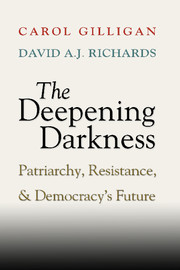Book contents
- Frontmatter
- Contents
- Acknowledgments
- Introduction and Overview
- Part One Roman Patriarchy: Entering the Darkness
- 1 Why Rome? Why Now?
- 2 Roman Patriarchy and Violence
- 3 Vergil on the Darkness Visible
- 4 Apuleius on Conversion
- 5 Augustine on Conversion
- Part Two Resistance Across Time and Culture
- Part Three Democracy's Future
- Conclusion
- Notes
- Bibliography
- Index
4 - Apuleius on Conversion
Published online by Cambridge University Press: 01 September 2010
- Frontmatter
- Contents
- Acknowledgments
- Introduction and Overview
- Part One Roman Patriarchy: Entering the Darkness
- 1 Why Rome? Why Now?
- 2 Roman Patriarchy and Violence
- 3 Vergil on the Darkness Visible
- 4 Apuleius on Conversion
- 5 Augustine on Conversion
- Part Two Resistance Across Time and Culture
- Part Three Democracy's Future
- Conclusion
- Notes
- Bibliography
- Index
Summary
Gibbon classically observed of the second-century Roman empire:
If a man were called to fix the period in the history of the world, during which the condition of the human race was most happy and prosperous, he would, without hesitation, name that which elapsed from the death of Domitian to the accession of Commodus. The vast extent of the Roman empire was governed by absolute power, under the guidance of virtue and wisdom. The armies were restrained by the firm but gentle hand of four successive emperors, whose characters and authority commanded involuntary respect. The forms of the civil administration were carefully preserved by Nerva, Trajan, Hadrian, and the Antonines, who delighted in the image of liberty, and were pleased with considering themselves as the accountable ministers of the laws. Such princes deserve the honour of restoring the republic had the Romans of their days been capable of enjoying a rational freedom.
Certainly, not all peoples benefited from the remarkable period of peace Gibbon describes under which “the policy of persecuting Christians first became widespread” and “the Roman provinces were racked with the revolt of the Jews under Trajan and Hadrian.” But in contrast to the centuries of imperial misrule and recurrent civil wars over the imperial succession, the period in question was marked by much more responsible government and general peace. The emperors Hadrian and Marcus Aurelius were famously devoted to Greek art and culture, including philosophy, and Marcus Aurelius wrote his Stoic Meditations in Greek, not Latin.
- Type
- Chapter
- Information
- The Deepening DarknessPatriarchy, Resistance, and Democracy's Future, pp. 82 - 101Publisher: Cambridge University PressPrint publication year: 2008



